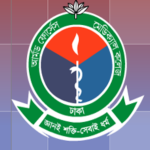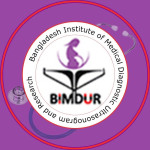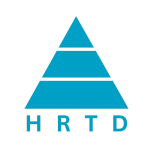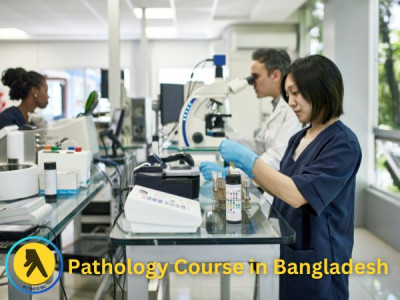All Pathology Course Institute Details

Armed Forces Institute of Pathology
Opposite Radisson Blu, Beside Kurmitola General Hospital, Dhaka-1206
To keep up with the global advancement of medical science, the nation's medical education has been evolving continuously. The Bangladesh Armed Forces recognized the need for a group of young people who are enthusiastic, driven, and committed to leading the health sector in the twenty-first century. The Armed Forces Medical Colle...
...show moreOpen: 12:00 am
Close: 11:59 pm

BIMDUR Ultrasound
The Emporium Bhabon 14/1 Mirpur Road Shyamoli Bus stand (A-2 2nd Floor), Shyamoli
BIMDUR is a top-ranking private training institute in Bangladesh in terms of quality of education and research, and one of the few to have the approval of the government to permanently establish and operate the institute. BIMDUR always strives to maintain high quality in its teaching and research. The institution is committed to...
...show moreOpen: 08:00 am
Close: 10:00 pm

LMAF Training Center
Section 6, Block- Kha, Road-1-Plot-11, 1216 Mirpur 10 Roundabout, Dhaka-1207
Training is practical work which is based on education. Training is essential for development. Example, Pushing Injection, Pushing saline infusion, Blood glucose measurement with glucometer, Blood pressure measurement, Heart rate measurement, Pulse measurement, Heart sound, pulmonary auscultation, clearing, Dressing, Bandaging, ...
...show moreOpen: 09:00 am
Close: 06:00 pm

Pathology Course Institute in Bangladesh
The study of diseases' characteristics, causes, and effects is known as pathology. It is a crucial area of medicine that aids in comprehending the alterations to tissues and organs that take place during an illness. Examining tissue samples, blood samples, and other bodily fluids is part of the study of pathology and is used to identify diseases and direct treatment. Students in Bangladesh who take a pathology course might learn the knowledge and abilities needed to excel in this sector.
Bangladesh is a developing nation whose healthcare system is expanding quickly. Numerous health issues exist in the nation, such as the high prevalence of infectious diseases like malaria, TB, and dengue fever. As a result, Bangladesh has a growing need for pathologists with training.
In Bangladesh, a number of institutions and medical schools provide pathology studies. The goal of these classes is to give students a solid foundation in both the academic and practical facets of pathology. The study of human anatomy, physiology, microbiology, and biochemistry is covered in the course material. The students also get knowledge of the many pathology methods, including histology, cytology, and molecular pathology.
The ability to provide precise and trustworthy disease diagnoses is one of the key goals of a pathology course in Bangladesh. The findings of tests done on patients, such as blood, urine, and tissue biopsies, are to be interpreted by pathologists. They need to be able to tell the difference between healthy and unhealthy cells and tissues and pinpoint the particular disease that is the cause of the anomalies. A thorough understanding of the biology and pathophysiology of many diseases is necessary for this.
A pathology course in Bangladesh should also include instruction in laboratory methods. Pathologists need to be skilled in a variety of laboratory procedures, such as processing tissue, staining, and microscopy. Additionally, they must be adept at using a number of tools and apparatus, including microscopes, spectrophotometers, and flow cytometers. In the course of their studies, the students receive practical instruction in these methods.
Communication skills are also emphasized in a pathology course in Bangladesh. Physicians, nurses, laboratory technicians, and other healthcare professionals collaborate closely with pathologists. To ensure precise diagnoses and suitable treatment, they must be able to communicate with these experts efficiently. Students get knowledge on how to communicate difficult medical information to non-medical professionals and how to produce reports that are clear and concise.
A pathology course in Bangladesh must keep up with the rapid changes in the field of pathology. The most recent innovations in the discipline, like new diagnostic methods and therapies, are covered in the curriculum. Additionally, new infectious illnesses and their diagnosis and treatment are taught to students. This guarantees that the pupils have the most recent knowledge and abilities to offer top-notch pathology services.
Both undergraduate and graduate pathology programs are available in Bangladesh. The undergraduate program culminates in the Bachelor of Medicine and Bachelor of Surgery (MBBS) degree and typically lasts four to five years. The postgraduate pathology programs typically last two to three years and result in a Master of Science (MSc) or Doctor of Medicine (MD) degree.
Graduates from pathology programs in Bangladesh can choose from a variety of job paths. Hospitals, clinics, research facilities, and pharmaceutical firms all employ pathologists. They can analyze evidence for criminal investigations as forensic pathologists. Bangladesh's expanding healthcare system is likely to increase demand for pathologists in the nation.
Finally, a pathology education in Bangladesh gives learners a firm grounding in both the theoretical and practical facets of pathology. A wide range of subjects are included in the curriculum, including anatomy, physiology, microbiology, and biochemistry. Students gain practical experience in laboratory procedures and improve their communication abilities. Bangladeshi pathology course graduates have a variety of exciting job options, including work in medicine, research, and forensics.
No Review